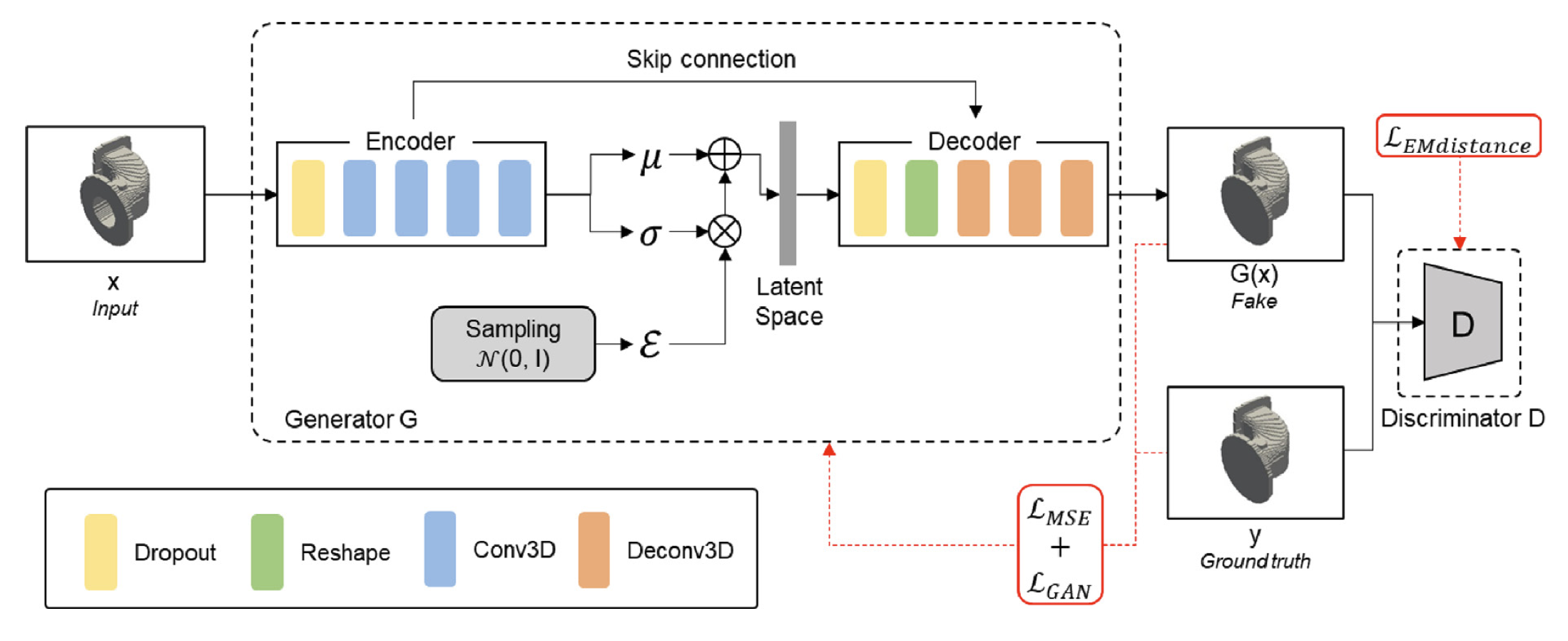Most three-dimensional (3D) computer-aided design (CAD) models of mechanical parts, created during the design stage, have high shape complexity. The shape complexity required of CAD models reduces according to the field of application. Therefore, it is necessary to simplify the shapes of 3D CAD models, depending on their applications. Traditional simplification methods recognize simplification target shape based on a pre-defined algorithm. Such algorithm-based methods have difficulty processing unusual partial shapes not considered in the CAD model. This paper proposes a method that uses a network based on a generative adversarial network (GAN) to simplify the 3D CAD models of mechanical parts. The proposed network recognizes and removes simplification target shapes included in the 3D CAD models of mechanical parts. A 3D CAD model dataset was constructed to train the 3D CAD model simplification network. 3D CAD models are represented in voxel form in the dataset. Next, the constructed training dataset was used to train the proposed network. Finally, a 3D voxel simplification experiment was performed to evaluate the performance of the trained network. The experiment results showed that the network had an average error rate of 3.38% for the total area of the mechanical part and an average error rate of 14.61% for the simplification target area.
Simplification of 3D CAD Model in Voxel Form for Mechanical Parts Using Generative Adversarial Networks


Karthik Ramani
Karthik Ramani is the Donald W. Feddersen Professor of School of Mechanical Engineering at Purdue University, with courtesy appointments in Electrical and Computer Engineering and College of Education. He earned his B.Tech from the Indian Institute of Technology, Madras, in 1985, an MS from Ohio State University, in 1987, and a Ph.D. from Stanford University in 1991, all in Mechanical Engineering. He has received many awards from the National Science Foundation (NSF) and other organizations. He has served in the editorial board of Elsevier Journal of Computer-Aided Design (CAD) and the ASME Journal of Mechanical Design (JMD). In 2008 he was a visiting Professor at Stanford University (computer sciences), research fellow at PARC (formerly Xerox PARC). In 2016 summer he was visiting professor Oxford University Institute of Mathematical Sciences. He also serves on the Engineering Advisory sub-committee for SBIR/STTR for the NSF. In 2006 and 2007, he won the Most Cited Journal Paper award from CAD and the Research Excellence award in the College of Engineering at Purdue University. In 2009, he won the Outstanding Commercialization award from Purdue University. He was the co-founder of the world’s first commercial shape-based parts search engine (VizSeek) and more recently co-founded ZeroUI whose product (Ziro) won the Best of Consumer Electronics Show Finalist (CES 2016). His research interests are in the internet-of-things, augmented reality, modular and flexible robotic platforms, and human-machine interactions. His current projects include computer vision for object detection and grasp planning, modular robotic platform design, shape recognition using geometric deep learning, and physical reality simulation platform. His current research emphasis is to develop a Physical-Simulation Platform that will allow one to realistically simulate interactions between workers, robots, and machines in future workplaces such as factories and warehouses.
